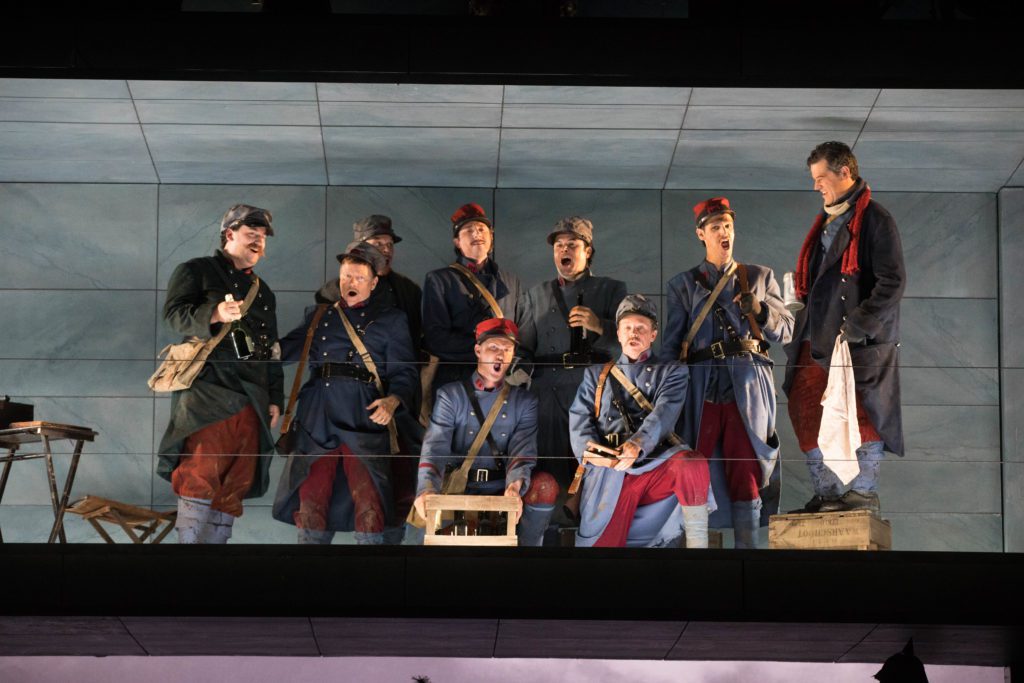Kevin Puts on His Pulitzer-Winning Opera: ‘Silent Night’
By • November 8, 2018 0 610

Art — not all art, but most and much of it — and artists — not all artists but many — strive to explain and describe the world to us, to help us make sense of it, in joyful, painful, exhilarating, even debilitating and searing ways, especially in distressing and confusing times.
The much-honored composer Kevin Puts explained that, perhaps the reason there is no easily identifiable musical denominator in what is already a fairly large body of work, is that he’s drawn to a variety of subjects by way of a variety of forms, “to find the proper musical language for what it is I’m doing.”
That quizzical, endlessly curiosity-filled, sometimes “obsessive” approach led him, as well as librettist Mark Campbell (they worked thereafter on the opera version of the sinister, claustrophobic film “The Manchurian Candidate”) — to “Joyeux Noel,” a 2005 film.
“Joyeux Noel” became “Silent Night,” an opera which would debut at the Minnesota Opera in 2011. It is now coming to the Kennedy Center’s Eisenhower Theater from Nov. 10 to 25, an original Washington National Opera production of the Wexford Festival production with the Atlanta Opera and Glimmerglass Opera.
It’s a tale of World War I on the Western Front, the first Christmas of an already butchering war which began in August of 1914. The war-weary soldiers on the front — groups of French, German and Scottish soldiers — decide to declare an unofficial truce and cease-fire to greet and mingle with their counterparts, exchanging gifts, singing carols and seeing each other as human beings before resuming the slaughter.
The premise is by no means simple. It includes other characters: soldiers, officers, their loved ones back home and an opera singer, whose presence, while seemingly coincidental, is also entirely appropriate.
Puts is a master of all kinds of forms, including symphonic music (“The City”), choral and so on, down and up the classical music ladder. He is a composer of modern, but also mostly accessible music, who has also taught and lectured all over the United States, including Baltimore, where he is a member of the composition faculty at the Peabody Conservatory of the Johns Hopkins University.
“I had been looking to work with music that tells a story, a narrative kind of piece,” Puts said. “To me, the music and the work was important in terms of the times. And interestingly enough, it has retained its power to be in the time. It continues to be performed and interest in it remains strong.”
The Washington run of “Silent Night” coincides with the centennial of Armistice Day (now Veterans Day), which commemorates the end of World War I, but not the end of world wars.
“It was a challenging project. You’re dealing with an opera in English, but in which the characters speak or sing in several different languages — French, English, German and so on. The staging is in some ways very cinematic, and dramatic, in a different way from traditional opera, and there are numerous different kinds of music — arias, from the opera singer to be sure, carols and songs — to thematically structure the music. It is a contemporary opera, which doesn’t necessarily mean atonal, but is current, and modern, nevertheless.”
“Silent Night” — Puts’s first opera, no less — proved to be, if not a turning point or a sea change, certainly a critical juncture in terms of success. He won the Pulitzer Prize for composition in 2012 for the opera, and he continued his collaboration with Campbell on “Candidate.” “I’m working on a song cycle now from the letters of Georgia O’Keeffe,” he said.
Talking with Puts is without question very much the experience of talking with an artist, which might seem obvious. But this is not about philosophy, the meaning of life and music, necessarily. It’s about response to subject, to time and place, to flat-out curiosity. His music seems reactive. It allows you to see subjects differently, from all directions, with clarity, making sense out of the chaos.
“Music is language,” he says. “‘Silent Night’ presents challenges in that way, making German, French or a Scottish thing or English identifiable in a musical way.”
As “Silent Night” makes its way through its WNO run, it finds its echo and salve in the times. “No question we live in divisive times,” he said in a telephone interview a few days before the midterm elections. “I remember the 2016 elections,” he said. “It came out of thin air.”
He added: “Music, especially, has its context. I think we can, musically, emotionally, get close to the people in this opera, even though they are different politically, language- and culture-wise, different in every way possible. The need is there for them to see each other, to stop for a time the war around them, the environment they live in.”
Puts himself goes to Mozart to listen, which may not come as a surprise, given the diverse interests and productivity they share. His young son, on the other hand, prefers to listen to pop star Ariana Grande.
The WNO production is directed by Tomer Zvulun, conducted by Nicole Paiement and features soprano Raquel González, tenor Alexander McKissick, bass Kenneth Kellogg and tenor Patrick Cook as the Crown Prince.

